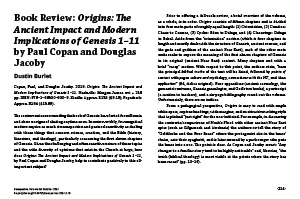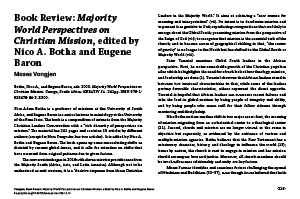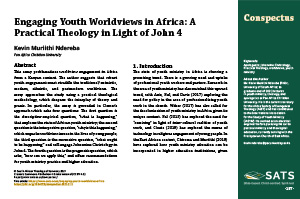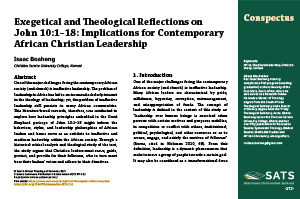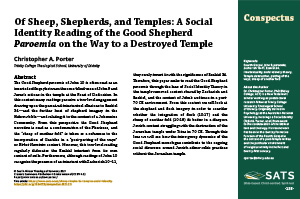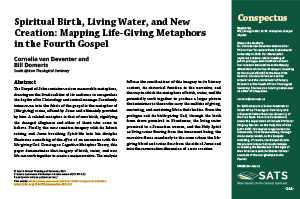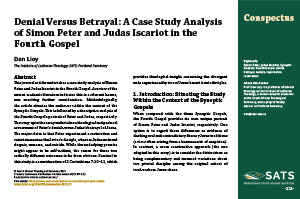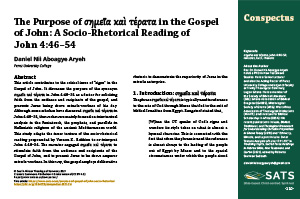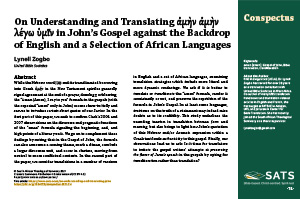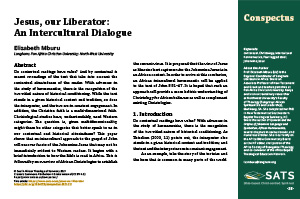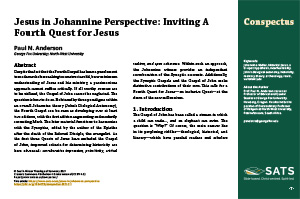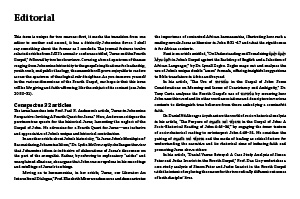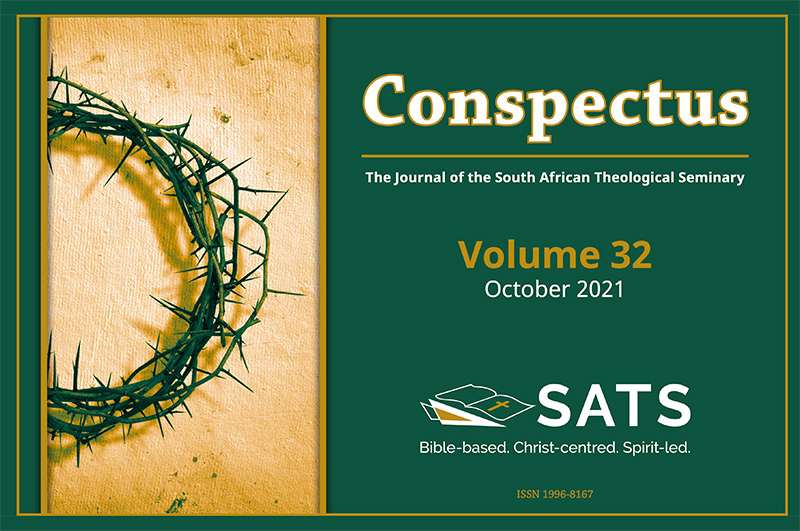Book Review: Origins: The Ancient Impact and Modern Implications of Genesis 1–11 by Paul Copan and Douglas Jacoby
The controversies surrounding the book of Genesis have lasted for millennia and show no signs of abating anytime soon. Incontrovertibly, few exegetical matters require as much circumspection and pastoral sensitivity as dealing with those things that concern science, creation, and the Bible…
Conspectus 32
October 2021
Book Review: Majority World Perspectives on Christian Mission, edited by Nico A. Botha and Eugene Baron
The book is a compendium of extracts from the Majority Christian Leaders Conversation with a “rich diversity of perspectives on mission.” The material has 241 pages and contains 13 articles by different authors (except for Hwa Yung who has two articles)…
The Prologue of John: A Conceptual Framework for African Public Theological Discourse
Keywords: incarnation, society, Africa, hermeneutics, theology
One of the recurring concerns in public theology is the possibility of arriving at a normative methodology. Some are of the opinion that a normative methodology is not necessary, while others think it matters and have proposed normative methodologies of their own. Furthermore, some think it matters but the nature of “public” and “theology” are too diverse to have a normative method…Engaging Youth Worldviews in Africa: A Practical Theology in Light of John 4
Keywords: Apologetics, Johannine Christology, Practical Theology, worldviews, youth ministry
This essay problematizes worldview engagement in Africa from a Kenyan context. The author suggests that robust youth engagement must straddle the traditional/animistic, modern, atheistic, and postmodern worldviews. The essay approaches the study using a practical theological methodology, which deepens the interplay of theory and praxis…Exegetical and Theological Reflections on John 10:1-18: Implications for Contemporary African Christian Leadership
Keywords: Africa, Shepherd leadership, Christian, sheep, servant
One of the major challenges facing the contemporary African society (and church) is ineffective leadership. The problem of leadership in Africa has led to an increased scholarly interest in the theology of leadership; yet, the problem of ineffective leadership still persists in many African communities…Of Sheep, Shepherds, and Temples: A Social Identity Reading of the Good Shepherd Paroemia on the Way to a Destroyed Temple
Keywords: Fourth Gospel, John 9, paroemia, Zechariah 10-11, Ezekiel 34, intertextuality, social identity theory, Temple destruction, parting of the ways, sheep of another fold
The Good Shepherd paroemia of John 10 is often read as an inserted soliloquy between the once-blind-man of John 9 and Jesus’s actions in the temple at the Feast of Dedication. In this context many readings perceive a two-level engagement drawing upon the perceived intertextual allusions to Ezekiel 34—and the further host of shepherd imagery in the Hebrew bible—and relating it to the context of a Johannine Community…Spiritual Birth, Living Water, and New Creation: Mapping Life-Giving Metaphors in the Fourth Gospel
Keywords: life, [living] water, birth, metaphor, Gospel of John
The Gospel of John contains various memorable metaphors, drawing on the lived realities of its audience to encapsulate the depths of its Christology and central message. Seamlessly interwoven into the fabric of the gospel is the metaphor of (life-giving) water, offered by Jesus and ultimately provided by him. A related metaphor is that of new birth, signifying the changed allegiance and ethos of those who come to believe…Denial Versus Betrayal: A Case Study Analysis of Simon Peter and Judas Iscariot in the Fourth Gospel
Keywords: Simon Peter, Judas Iscariot, Synoptic Gospels, Fourth Gospel, denial, betrayal, suicide, repentance, restoration
This journal article undertakes a case study analysis of Simon Peter and Judas Iscariot in the Fourth Gospel. A review of the extant academic literature indicates this is a relevant lacuna, one meriting further consideration. Methodologically, the article situates the endeavor within the context of the Synoptic Gospels. This is followed by a descriptive analysis of the Fourth Gospel’s portrait of Peter and Judas, respectively…The Purpose of σημεῖα καὶ τέρατα in the Gospel of John: A Socio-Rhetorical Reading of John 4:46–54
Keywords: σημεῖα καὶ τέρατα, John 4:46-54, miracles, faith, rhetoric
This article contributes to the critical issue of “signs” in the Gospel of John. It discusses the purpose of the synonym σημεῖα καὶ τέρατα in John 4:46–54 as a factor for soliciting faith from the audience and recipients of the gospel, and presents Jesus being above miracle-workers of his day. Although some scholars have discussed σημεῖα καὶ τέρατα in John 4:46–54…The Use of πιστεύω in the Gospel of John: Some Considerations on Meaning and Issues of Consistency and Ambiguity
Keywords: believe, believer, unbeliever, πιστεύω, Jesus, Father
John uses the verb πιστεύω (to believe) more often than do the Synoptic Gospels. The action of believing is important and central to John. There are references to people who are said to believe in Jesus and follow him. However, there are others who also believe but then turn away from Jesus. John uses the same verb πιστεύω throughout his gospel to indicate true believers in Jesus, but sometimes this identification appears unclear and/or ambiguous…On Understanding and Translating ἀμὴν ἀμὴν λέγω ὑμῖν in John’s Gospel against the Backdrop of English and a Selection of African Languages
Keywords: amen [amen], Gospel of John, Bible translation, transliteration
While the Hebrew word אָמןֵ and its transliterated borrowing into Greek μήν in the New Testament epistles generally signal agreement at the end of a prayer, doxology, or blessing, the “Amen (Amen), I say to you” formula in the gospels (with the repeated “amen” only in John) occurs clause-initially and serves to introduce certain direct quotes of our Savior. In the first part of this paper, we seek to confirm Clark’s 2004 and 2007 observations on the discourse and pragmatic functions of the “amen” formula…Jesus, our Liberator: An Intercultural Dialogue
Keywords: contextual, Christology, intercultural hermeneutics, four-legged stool, Johannine Jesus
Do contextual readings have value? And by contextual is meant re-readings of the text that take into account the contextual situatedness of the reader. With advances in the study of hermeneutics, there is the recognition of the two-sided nature of historical conditioning. While the text stands in a given historical context and tradition, so does the interpreter, and the two are in constant engagement. In addition, the Christian faith is a multi-dimensional faith…Is Jesus John’s Mouthpiece? Reconsidering Johannine Idiom
Keywords: Johannine idiom, historical Jesus, paraphrase, Fourth Gospel, Johannine discourses, Gospel historicity
Scholars commonly move from the premise that Jesus in the Fourth Gospel speaks in Johannine idiom to the conclusion that the evangelist elaborated Jesus’s teachings. We can evaluate this claim better if we distinguish paraphrase from elaboration, restricting the former concept to reports that would be recognizable both in content and in historical context…Jesus in Johannine Perspective: Inviting a Fourth Quest for Jesus
Keywords: Johannine riddles, historical Jesus, a bi-optic hypothesis, interfluentiality, John’s dialogical autonomy, historicity, memory theory, archaeology, realia, verisimilitude
Despite the fact that the Fourth Gospel has been a puzzlement to modern scholars seeking to construct a solid, bare-minimum understanding of Jesus and his ministry, a parsimonious approach cannot suffice critically. If all worthy sources are to be utilized, the Gospel of John cannot be neglected. The question is how to do so…
